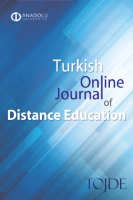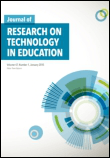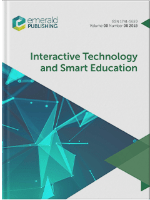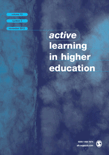
ETR&D-EDUCATIONAL TECHNOLOGY RESEARCH AND DEVELOPMENT
Scope & Guideline
Transforming Educational Landscapes with Research Insights
Introduction
Aims and Scopes
- Educational Technology Design and Development:
The journal emphasizes innovative design and development processes for educational technologies, including immersive environments, gamification, and AI applications, aimed at enhancing learning experiences. - Instructional Design Methodologies:
A core focus on instructional design strategies, including frameworks like TPACK and design-based research, to improve educational effectiveness and learner engagement. - Pedagogical Innovations:
Research on novel pedagogical approaches, such as blended learning, flipped classrooms, and collaborative learning, that leverage technology to foster deeper learning outcomes. - Assessment and Evaluation:
Studies that explore assessment methodologies and tools for measuring learning outcomes, student engagement, and the effectiveness of technology-enhanced learning environments. - Equity and Accessibility in Education:
A commitment to understanding and addressing the equity challenges in educational technology, ensuring inclusive access to learning resources for diverse populations.
Trending and Emerging
- Artificial Intelligence in Education:
An increasing focus on the implications of AI in educational contexts, including its role in personalized learning, assessment, and instructional design. - Immersive Learning Environments:
A surge in research on virtual reality (VR) and augmented reality (AR) applications, exploring their potential to enhance engagement and learning outcomes in various educational settings. - Collaborative and Social Learning:
Growing interest in collaborative learning frameworks and technology-enhanced peer interactions, emphasizing the importance of social presence and community in online learning. - Data-Driven Decision Making:
Emerging themes around learning analytics and educational data mining, focusing on how data can inform teaching practices and improve student learning experiences. - Sustainability and Ethical Considerations:
A rising trend towards exploring sustainability in educational technology, including ethical considerations related to data privacy, equity, and the environmental impacts of tech adoption.
Declining or Waning
- Traditional Instructional Methods:
A noticeable decrease in research centered around conventional teaching methods, as the journal increasingly focuses on innovative, technology-driven pedagogies. - Single-Technology Solutions:
A diminishing emphasis on studies that evaluate the effectiveness of isolated technologies without considering their integration into broader educational strategies and environments. - Basic Technology Literacy:
As educational technology becomes more ubiquitous, the focus on basic technology literacy is waning, giving way to more complex interactions involving AI, VR, and immersive learning.
Similar Journals

Turkish Online Journal of Distance Education
Empowering Educators through Open Access Insights.Turkish Online Journal of Distance Education, a distinguished publication from ANADOLU UNIVERSITY, serves as a vital resource in the field of distance education, contributing significantly to the ongoing discourse since its inception in 2000. With an impressive impact factor that reflects its standing within the academic community, this open access journal provides an influential platform for researchers, educators, and practitioners to disseminate innovative findings and educational strategies. Ranked in the Q2 category within the education sector according to the 2023 quartile rankings, and boasting a commendable position of #423 out of 1543 in Scopus' Social Sciences Education rankings, the journal places itself firmly within the 72nd percentile of its cohort. Spanning from 2004 to 2024, the journal's commitment to advancing scholarship in distance education is reflected not only in its comprehensive articles but also in its responsive engagement with contemporary educational challenges. Positioned in Eskişehir, Turkey, this journal aims to elevate discussions surrounding online learning and contributes to the global dialogue on education accessibility and innovation.

Problems of Education in the 21st Century
Fostering Critical Dialogue on Contemporary Education.Problems of Education in the 21st Century is a pivotal academic journal published by SCIENTIA SOCIALIS, focusing on the ever-evolving challenges and opportunities in the field of education. With its ISSN 1822-7864 and E-ISSN 2538-7111, the journal serves as an essential resource for researchers, educators, and policy makers interested in exploring contemporary educational issues, innovations, and practices. Although currently not indexed in Scopus, the journal has previously covered contributions between 2017 and 2019, providing a platform for critical dialogue in the field. Based in Lithuania, it emphasizes an open-access approach, fostering wide dissemination of research that informs educational advancements. With a Scopus rank in the 20th percentile within the Social Sciences and Education category, the journal invites contributions that examine significant topics impacting education today, ensuring a broad spectrum of scholarly discussion aimed at enhancing teaching and learning experiences in the 21st century.

International Journal of Education and Information Technologies
Fostering Research that Transforms Learning EnvironmentsWelcome to the International Journal of Education and Information Technologies, a leading academic platform published by NORTH ATLANTIC UNIV UNION-NAUN. With an emphasis on the integration of education and information technology, this journal aims to foster innovative research and discussions that enhance pedagogical practices and technological advancements in educational contexts. Although currently an open access journal, it provides unrestricted access to emerging studies that are crucial for educators, researchers, and professionals aiming to stay at the forefront of education technology. While specific metrics such as H-index and Scopus ranks are yet to be defined, its ISSN 2074-1316 signifies its credibility and commitment to quality scholarship. This journal serves as a vital resource for those passionate about bridging the gap between technology and education, encouraging impactful research that shapes the future of learning environments.

Journal of Research on Technology in Education
Empowering Educators through Technology-Driven Research.The Journal of Research on Technology in Education is a premier academic publication dedicated to exploring the intersection of technology and education. Published by ROUTLEDGE JOURNALS, TAYLOR & FRANCIS LTD, this journal stands at the forefront of educational research, boasting impressive Q1 rankings in both Computer Science Applications and Education for 2023. With an ISSN of 1539-1523 and an E-ISSN of 1945-0818, it is recognized in the Scopus database, ranking 31st out of 1543 in the field of Education, placing it in the 98th percentile, and 73rd out of 817 in the domain of Computer Science Applications, within the 91st percentile. The journal is committed to publishing high-quality research that informs practice and policy, with a scope that covers innovative uses of technology in educational settings from its inception in 2001 through 2024 and beyond. It is an essential resource for researchers, educators, and policymakers looking to harness the potential of technology in enhancing teaching and learning experiences.

Smart Learning Environments
Exploring the future of educational innovation.Smart Learning Environments, published by Springer Heidelberg, is a leading open-access journal dedicated to advancing the field of educational technology and intelligent learning systems. Since its inception in 2014, this journal has established itself as a vital resource for researchers and practitioners, showcasing innovative interdisciplinary approaches that enhance learning experiences using smart technologies. With a notable impact factor and recognition in the top quartiles (Q1) of both Computer Science Applications and Education, it ranks within the top 2% of journals in the Social Sciences – Education category and the top 7% in Computer Science, according to Scopus. The journal's scope encompasses empirical studies, theoretical papers, and reviews, making it an essential platform for disseminating cutting-edge research. Researchers, educators, and technology professionals are encouraged to engage with this premier outlet, which not only facilitates access to high-quality research but also promotes collaboration across academic and professional spheres.

Interactive Technology and Smart Education
Transforming education through interactive innovation.Interactive Technology and Smart Education is a leading academic journal published by EMERALD GROUP PUBLISHING LTD, dedicated to exploring the dynamic intersection of technology and education. With a robust impact factor signifying its significant contributions to the field, this journal consistently ranks in the Q1 quartile in categories such as Computer Science (Miscellaneous), Education, and E-learning, reflecting its prestige and wide-ranging influence. A staple for researchers, educators, and industry professionals, the journal addresses innovative practices and developments in interactive technologies that enhance teaching and learning experiences. Operating from its base in the United Kingdom, the journal spans nearly two decades of impactful publishing, featuring high-quality research that plays a crucial role in shaping the future of education through technology. Scholars seeking to stay at the forefront of this evolving field are encouraged to contribute and engage with the journal's pioneering work.

Innoeduca-International Journal of Technology and Educational Innovation
Pioneering Research at the Intersection of Technology and EducationInnoeduca - International Journal of Technology and Educational Innovation, published by the esteemed Universidad de Málaga, stands at the forefront of the rapidly evolving intersection of technology and education. With an E-ISSN of 2444-2925, this open-access journal has proudly disseminated cutting-edge research and innovative practices in educational technology since 2015. It aims to empower researchers, educators, and policymakers by providing a platform for sharing knowledge, insights, and advancements that enhance the learning experience through technology. The journal covers a wide array of topics, including digital learning environments, instructional design, and the impact of emerging technologies on education. By offering free access to its articles, Innoeduca fosters a global dialogue among professionals and students alike, making a significant contribution to the field of education innovation and technology.

Technology Pedagogy and Education
Elevating Educational Standards through Technology IntegrationTechnology Pedagogy and Education, published by Routledge Journals, Taylor & Francis Ltd, is a leading academic journal focused on the intersection of technology and educational practices. With an impact factor reflecting its significant contribution to the field, this journal provides a critical platform for disseminating innovative research and emerging trends in technology-enhanced learning. Serving as a resourceful hub since its inception in 2003, it has established itself in the top quartile of various categories, including Communication, Computer Science Applications, Education, and Information Systems. Researchers and educators alike will find the journal's insights invaluable as they navigate the ever-evolving landscape of educational technology. Although it does not currently offer open access options, its rigorous peer-review process ensures that only the highest quality research is published, making it essential reading for anyone invested in the educational sector.

Active Learning in Higher Education
Empowering Educators to Innovate and InspireActive Learning in Higher Education is a premier journal dedicated to exploring innovative and effective pedagogical practices within the realm of higher education. Published by SAGE Publications Inc, this journal boasts an impressive Q1 ranking in the Education category for 2023, positioning it within the top percentile of academic journals in the field, with a Scopus rank of 21 out of 1543, reflecting its high impact and relevance. With coverage spanning from 2000 to 2024, the journal serves as a critical platform for researchers, educators, and students, providing insightful articles that delve into the theories, strategies, and technologies that enhance active learning experiences. While currently not open access, the enriching content is vital for anyone aiming to stay abreast of evolving methodologies and empirical studies in educational practices. Located in the United Kingdom, this journal is committed to advancing the academic discourse surrounding higher education, making it essential reading for those interested in fostering student engagement and learning outcomes.

Education and Information Technologies
Transforming education through technology.Education and Information Technologies, published by SPRINGER, is a leading journal dedicated to the intersection of educational practices and innovative information technologies. With an impressive impact factor and consistently ranked in the Q1 quartile across Education, E-learning, and Library and Information Sciences, this journal serves as an essential resource for researchers and professionals aiming to explore the dynamic landscape of educational technology. Spanning from 1996 to 2024, it provides a platform for high-quality, peer-reviewed articles that contribute to the evolving discourse in this critical field. The journal’s rigorous Scopus ranking, placing it in the top 4% of Social Sciences Education and top 6% in Library and Information Sciences, highlights its significance in advancing scholarly knowledge. While it offers various access options, the focus remains on delivering cutting-edge research that can inform teaching practices and technological integration in education, making it indispensable for students, educators, and technology developers alike.